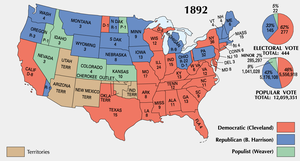Populist Party (United States)
|
|
The Populist Party was a short-lived political party in late 19th century in the United States. In some states, it was known as the People's Party. It flourished among western farmers, based largely on its opposition to the gold standard. Although the party did not remain a lasting feature of the political landscape, many of its positions have became adopted over the course of the following decades. The very term "populist" has since become a generic term in U.S. politics for politics which appeals to the common person in opposition to established interests.
| Contents |
History
The Populist Party grew of the agrarian revolt that rose after the collapse of agriculture prices following the Panic of 1873. The Farmers' Alliance, formed in Lampasas, Texas in 1876, promoted collective economic action by farmers and achieved widespread popularity in the South and Great Plains. The Farmers' Alliance was ultimately unable to achieve its wider economic goal of collective economic action against brokers, railroads, and merchants, and many in the movement agitated for changes in national policy. By the late 1880s, the Alliance had developed a political agenda that called for regulation and reform in national politics, most notably an opposition to the gold standard to counter the deflation in agricultural prices.
The drive to create a new political party out of the movement arose from the refusal of both Democrats and Republicans to take up and promote the policies advocated by the Alliance, notably in regard to the Populists' call for unlimited coinage of silver. The promotion of silver as legal tender was especially favored by farmers as a means of countering the deflation of agricultural prices and allowing credit to flow more easily through the rural banking system.
The Populist Party was formed by members of the Alliance, in conjunction with the Knights of Labor, in 1889–1890. The movement reached its peak in 1892 when the party held a convention in Omaha, Nebraska and nominated candidates for the national election.
The party's platform called for the abolition of national banks, a graduated income tax, direct election of Senators, civil service reform, and a working day of eight hours. In the 1892 Presidential election, James B. Weaver received 1,027,329 votes. Weaver carried four states (Colorado, Kansas, Idaho, and Nevada) and received electoral votes from Oregon and North Dakota as well.
The party flourished most among farmers in the Southwest and Great Plains. Opposition to the gold standard was especially strong among western farmers, who viewed the inherent scarcity of gold (and its slow movement through the banking system) as an instrument of Eastern banking interests who could force mass bankruptcies among farmers in the west by instigating "credit crunches". Many western farmers rallied around the Populist banner in the belief that "easy money" not backed by a hard mineral standard would allow credit to flow more freely through rural regions.
By 1896, the Democratic Party took up many of the Populist Party's causes and the party faded from the national political scene. Democratic candidate William Jennings Bryan took up the Populist opposition to the gold standard in his famous Cross of gold speech. The nation nevertheless remained on the gold standard, a fact that some (but by no means all) economic historians blame for the banking crisis during the Great Depression. The Populist position was fully vindicated in 1973 when Richard Nixon withdrew the gold backing of the U.S. currency.
Likewise, the Populist Party's call for direct election of Senators was realized in 1913 with the ratification of the Seventeenth Amendment. The party's call for civil service reform became a part of the United States Progressive Party platform.
Modern incarnations
The enduring appeal of the term "populist" has led to several modern attempts to form political parties using the label. In each none of the parties has any connection to its manifestation in the late 19th century.
In 1984, the Populist Party name was revived by some extreme right activists including Willis Carto. It had no connection to the earlier Populist Party. The party's 1984 presidential nominee, Olympic medalist and ordained minister Bob Richards and running mate Maureen Salaman carried 66,324 votes. This party became the electoral vehicle for the right-wing Presidential campaigns of former Ku Klux Klan leader David Duke in 1988, and of former Green Beret officer Bo Gritz in 1992, but was defunct by 1996. Willis Carto and party chair Don Wassall were said to be rivals competing for control of the party, and supporters of each side blame the other for the party's collapse.
See also
References
- Goodwyn, Lawrence. 1978. The Populist Moment: A Short History of the Agrarian Revolt in America. Oxford: Oxford University Press. (ISBN 0195024168 or ISBN 0195024176)
- Kazin, Michael. 1995. The Populist Persuasion: An American History. New York: Basic Books. (ISBN 0465037933)
- McMath, Robert C. Jr. 1993. American Populism: A Social History 1877-1898. New York: Hill and Wang; Farrar, Straus & Giroux. (ISBN 0809077965)
- Nugent, Walter T. K. 1962. The Tolerant Populists: Kansas Populism and Nativism. Chicago: University of Chicago Press.
- Stock, Catherine McNicol. 1996. Rural Radicals: Righteous Rage in the American Grain. Ithaca, N.Y.: Cornell University Press. (ISBN 0801432944)
External links
- Populist Party of America (http://www.populistamerica.com/)

